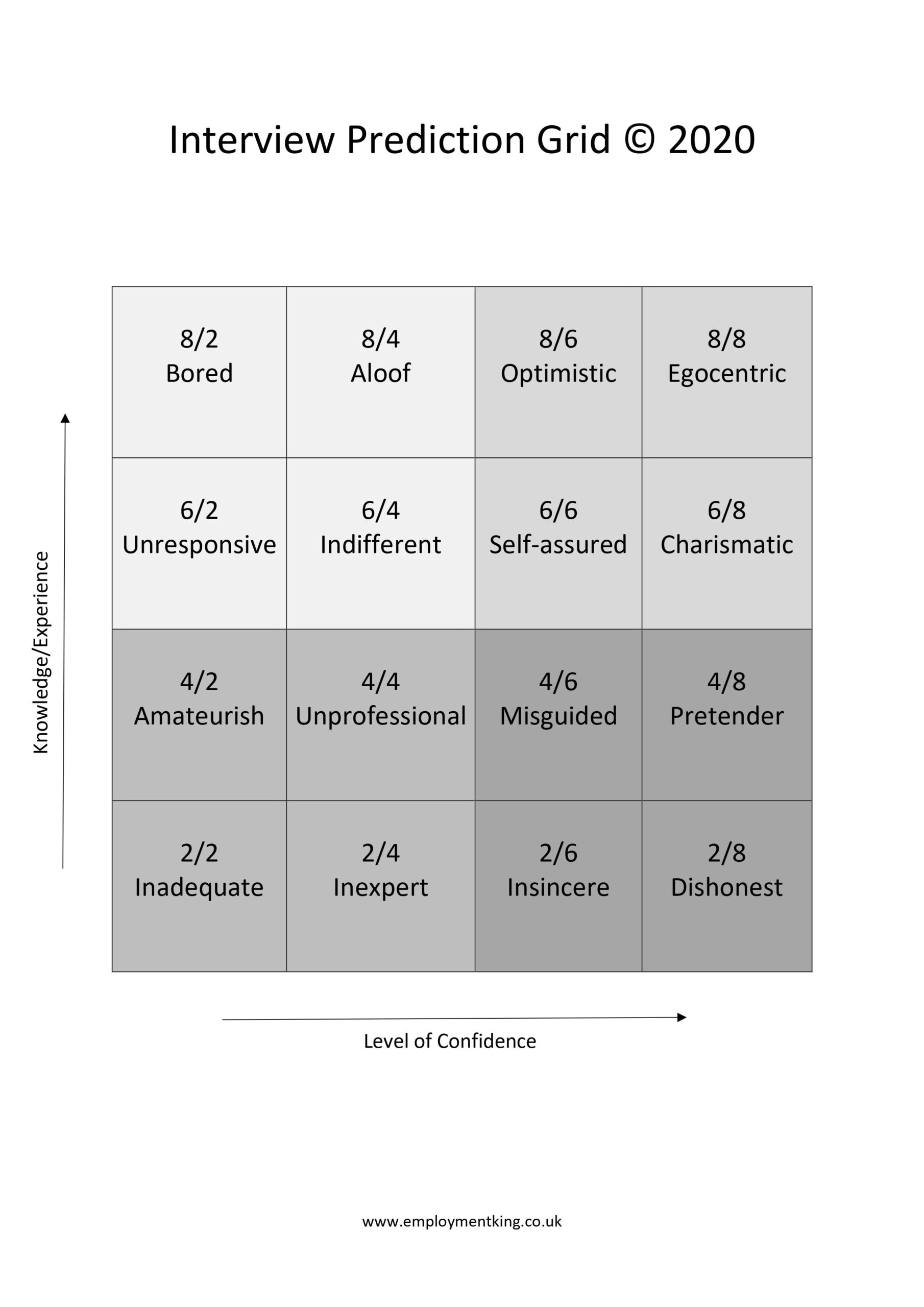Congratulations on completing the Interview Prediction Grid Test (IPG) ©2020.
Below is a breakdown of your Interview Identity
6/6 – Self-Assured

Just about all 6/6 – Self-assured applicants will easily build rapport with a job interviewer as their medium confidence level and knowledge/experience is expressed with industry-related anecdotes and detailed examples.
Being medium in both knowledge/experience and level of confidence, 6/6 – Self-assured individuals are aware of their own abilities and express them well.
Within the high/high segment, 6/6 – Self-assured applicants are the lowest scoring in the quadrant. This does not mean they will be unsuccessful against other high/high interviewees, as some applicants with an 8-level of confidence can overplay their hand. But the reality is that 6/6 – Self-assured career professionals are often at the beginning of their senior-level career, applying for roles against other, more experienced, high/high applicants.
Strengths
Being confident, but not overbearing increases likeability. The interviewer’s opinion of 6/6 – Self-assured applicants improves when they talk with authority on subjects relevant to the job criteria.
Descriptions of past experiences are delivered conversationally while remaining focused on the interviewer’s question. Each answer sounds simple, but underlying the strengths of these replies is a structure designed to explain the situational problem the applicant faced, the steps taken to overcome the barrier and the positive outcome that was the result of their well-planned actions. In short, answers are filled with self-praise.
The pace, tonality and non-verbal communication is relaxed and welcoming, disarming a cold interviewer. This is especially true when explaining past experiences and well used sector models.
Industry-related knowledge has been gained from working in the sector over a long duration. Often these career professionals have worked their way up from low-skilled positions giving the applicant an insight into the workings of an organisation from different viewpoints. When applying for managerial roles, this level of knowledge can be invaluable.
Other 6/6 – Self-assured applicants with less industry experience are likely to have Level 7 qualifications, arming them with an in-depth knowledge of sector related theories and models. Either way, possessing a medium level of knowledge/experience complements their competent delivery style, putting an employer at ease.
Development
Applying for medium-skilled roles, the 6/6 – Self-assured applicant is in a strong position, as the other three interview identities from the high/high segment are likely to only apply for highly skilled roles.
In preparation for highly skilled positions, where competition is at its highest, the self-assured applicant needs to take steps to be viewed as more suitable than other high/high applicants.
An easy solution to improve the level of knowledge/experience is to gain professional industry qualifications (as an example an engineer can become chartered) or for Level 6 qualified applicants to gain a Level 7-8 qualification. What is important is to gain the required qualifications or knowledge by completing CPD (continued professional development) qualifications relevant to the position being applied for.
For high level positions, employers are often looking for an applicant who is an authority on a subject. It is the positioning of this authority within the job interview that can be the difference between receiving the job offer or not. Successful career professionals as well as showcasing their expertise, make it relevant to each organisation they are applying to work for.
Confidence is at the top end of the sufficient level due to the level of knowledge/experience, but when interviewed by an expert interviewer who is determined to test every interviewees’ competencies, cracks can form in the applicants’ composure.
Being able to debate a subject well isn’t the same as having the ability to persuade another person to take on your ideas, as an ‘8’ confident applicant would be able to do.
To beat other high/high candidates the 6/6 – Self-assured applicant needs to first understand that competitive applicants may be more persuasive or simply have the required expertise needed by the employer.
The skill of influence comes from being adept at emotional intelligence, knowing, through the interviewer’s verbal and non-verbal cues, how each interview answer is being received and amending answers as required. Skilled manipulators are able to hear the motivational preferences of an interviewer and change their own language, behaviour and word choice to frame each answer, so it resonates with each interviewer.

Advice for the job interview
- Explain industry theories with authority. When giving a suggestion, do so with conviction. Interviewers respond well to assertive individuals
- Share opposing viewpoints when discussing sector models. Not only does disputing well-known frameworks show confidence, it gives the employer an insight into your understanding of industry-related processes and problems
- Use academic language, acronyms and jargon when appropriate. Utilise storytelling and forecast data from the solutions you would implement once employed
Research: IPG






